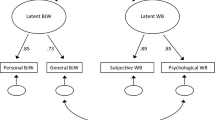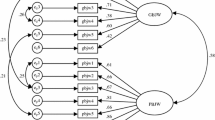Abstract
Differences between personal and general belief in a just world were studied in four questionnaire studies and one experiment. Personal just world belief could reliably be differentiated from general just world belief, and subjects endorsed more strongly the personal compared to the general just world belief. Moreover, personal belief in a just world predicted subjective well-being and self-esteem, and this positive impact was independent of general just world belief and favorable self-perceptions. Finally, the more subjects were aware of their own unfairness, the more the personal belief in a just world showed a negative impact on self-esteem. Results give evidence to the just world beliefs' character as world views and as indicators of a personal contract between individual and social world.
Similar content being viewed by others
REFERENCES
Beck, A. T., Rush, A. J., Shaw, B. F., and Emery, G. (1981). Kognitive Therapie der Depression (Cognitive therapy of depression). Urban & Schwarzenberg, München.
Becker, P. (1986). Theoretischer Rahmen. In Becker, P. and Minsel, B. (eds.), Psychologie der seelischen Gesundheit (Psychology of mental health) (S. 1-90). Hogrefe, Göttingen.
Benson, D. E., and Ritter, C. (1990). Belief in a just world, job loss and depression. Sociolog. Focus 23: 49-63.
Bierhoff, H. W. (1996). Egozentrische Verzerrungen bei Fairness-Urteilen (Egocentric bias in fairness judgments). Paper presented at the 40th congress of the German Society of Psychology.
Bierhoff, H. W., Klein, R., and Kramp, P. (1991). Evidence for the altruistic personality from data on accident research. J. Pers. 59: 263-280.
Bulman, R. J., and Wortman, C. B. (1977). Attributions of blame and coping in the “real world”: Severe accident victims react to their lot. J. Pers. Soc. Psychol. 35: 351-363.
Cantor, N. (1990). From thought to behavior. Am. Psychologist 45: 735-750.
Dalbert, C. (1982). Der Glaube an die gerechte Welt. Zur Güte einer deutschen Version der Skala von Rubin & Peplau (Berichte aus der Arbeitsgruppe “Verantwortung, Gerechtigkeit, Moral” Nr. 10) (Reports from the research unit “Responsibility, Justice, Morality” No. 10). Universität Trier, Trier.
Dalbert, C. (1992a). Der Glaube an die gerechte Welt: Differenzierung und Validierung eines Konstrukts (The belief in a just world: Differentiation and validation of a construct). Zeitschrift für Sozialpsychologie 23: 268-276.
Dalbert, C. (1992b). Subjektives Wohlbefinden junger Erwachsener: Theoretische und empirische Analysen der Struktur und Stabilität (Young adults' subjective well-being: Theoretical and empirical analyses of its structure and stability). Zeitschrift für Differentielle und Diagnostische Psychologie 13: 207-220.
Dalbert, C. (1993a). Gefährdung des Wohlbefindens durch Arbeitsplatzunsicherheit: Eine Analyse der Einflußfaktoren Selbstwert und Gerechte-Welt-Glaube (Endangering subjective well-being by job insecurity: An analysis of the impact of self-esteem and belief in a just world). Zeitschrift für Gesundheitspsychologie 1: 235-253.
Dalbert, C. (1993b). The Personal Belief in a Just World Scale (PBJWS). Unpublished scale.
Dalbert, C. (1996). Über den Umgang mit Ungerechtigkeit. Eine psychologische Analyse (Dealing with injustice. A psychological analysis). Huber, Bern.
Dalbert, C. (1997). Coping with an unjust fate: The case of structural unemployment. Soc. Just. Res.; Special Issue: “Job Loss, Unemployment, and Social Injustices” 10: 175-189.
Dalbert, C. (1998). Belief in a just world, well-being, and coping with an unjust fate. In Montada, L., and Lerner, M. J. (eds.), Responses to victimization and belief in a just world, Plenum, New York, pp. 87-105.
Dalbert, C., Montada, L., and Schmitt, M. (1987). Glaube an eine gerechte Welt als Motiv: Validierungskorrelate zweier Skalen (Belief in a just world: Validity correlates of two scales). Psychologische Beiträge 29: 596-615.
Dalbert, C., Montada, L., Schmitt, M., and Schneider, A. (1984). Existentielle Schuld: Ergebnisse der Item-und Skalenanalysen (Berichte aus der Arbeitsgruppe “Verantwortung, Gerechtigkeit, Moral”, Nr. 25) (Reports of the research group “Responsibility, Justice, Morality” No. 25). Universität Trier, Trier.
Dalbert, C., and Yamauchi, L. (1994). Belief in a just world and attitudes toward immigrants and foreign workers: A cultural comparison between Hawaii and Germany. J. Appl. Soc. Psychol. 24: 1612-1626.
Deusinger, I. M. (1986). Die Frankfurter Selbstkonzeptskalen (FSKN) (The Frankfurt Self Concept Scales). Hogrefe, Göttingen.
Diener, E., Emmons, R. A., Larsen, R. J., and Griffin, S. (1985). The satisfaction with life scale. J. Pers. Assess. 49: 71-75.
Epstein, S. (1990). Cognitive-experiential self-theory. In Pervin, L. A. (ed.), Handbook of Personality Theory and Research, Guilford Press, New York, pp. 165-192.
Farwell, L., and Weiner, B. (1996). Self-perception of fairness in individual and group contexts. Pers. Soc. Psychol. Bull. 22: 868-881.
Ferrari, J. R., and Emmons, R. A. (1994). Procrastination as revenge: Do people report using delays as a strategy for vengeance? Pers. Ind. Diff. 17: 539-544.
Furnham, A., and Beard, R. (1995). Health, belief in a just world and coping style preferences in patients of complementary and orthodox medicine. Soc. Sci. Med. 40: 1425-1432.
Furnham, A., and Procter, E. (1989). Belief in a just world: Review and critique of the individual difference literature. Br. J. Soc. Psychol. 28: 365-384.
Hafer, C. L. (in press). Investment in long-term goals and commitment to just means drive the need to believe in a just world. Pers. Soc. Psychol. Bull.
Hafer, C. L., and Olson, J. M. (1993). Beliefs in a just world, discontent, and assertive actions by working women. Pers. Soc. Psychol. Bull. 19: 30-38.
Kiecolt-Glaser, J. K., and Williams, D. A. (1987). Self-blame, compliance, and distress among burn patients. J. Pers. Soc. Psychol. 53: 187-193.
Lerner, M. J. (1965). Evaluation of performance as a function of performer's reward and attractiveness. J. Pers. Soc. Psychol. 1: 355-360.
Lerner, M. J. (1970). The desire for justice and reactions to victims. In Macaulay, J., and Berkowitz, L. (eds.), Altruism and Helping Behavior, Academic Press, New York.
Lerner, M. J. (1977). The justice motive: Some hypotheses as to its origins and forms. J. Pers. 45: 1-32.
Lerner, M. J. (1978). “Belief in a just world” versus the “authoritarianism” syndrome... but nobody liked the Indians. Ethnicity 5: 229-237.
Lerner, M. J., and Miller, D. T. (1978). Just world research and the attribution process: Looking back and ahead. Psycholg. Bull. 85: 1030-1051.
Lerner, M. J., and Simmons, C. H. (1966). The observer's reaction to the “innocent victim”: Compassion or rejection? J. Pers. Soc. Psychol. 4: 203-210.
Lerner, M. J., and Somers, D. G. (1992). Employees' reactions to an anticipated plant closure: The influence of positive illusions. In Montada, L., and Filipp, S. H. (eds.), Life crises and experiences of loss in adulthood, LEA, Hillsdale, N.J.
Libow, J. A., and Doty, D. W. (1979). An exploratory approach to self-blame and self-derogation by rape victims. Am. J. Orthopsychiatry 49: 670-679.
Lipkus, I. (1991). The construction and preliminary validation of a global belief in a just world scale and the exploratory analysis of the multidimensional belief in a just world scale. Pers. Ind. Diff. 12: 1171-1178.
Lipkus, I. M., Dalbert, C., and Siegler, I. C. (1996). The importance of distinguishing the belief in a just world for self versus others. Pers. Soc. Psychol. Bull. 22: 666-677.
Lipkus, I. M., and Siegler, I. C. (1993). The belief in a just world and perceptions of discrimination. J. Psychol. 127: 465-474.
McNair, D. M., Lorr, M., and Doppleman, L. F. (1971). EITS—Manual for the Profile of Mood States. San Diego, California: Educational and Industrial Testing Service.
Messick, D. M., Bloom, S., Boldizar, J. P., and Samuelson, C. D. (1985). Why we are fairer than others. J. Exper. Soc. Psychol. 21: 480-500.
Olkin, J., and Siotani, M. (1964). Asymptotic distribution functions of a correlation matrix. Stanford, CA: Stanford University Laboratory for Quantitative Research in Education, Report No. 6. (cited from: J. Bortz (1989), Statistik (Statistics). Springer, Heidelberg).
Rim, Y. (1986). Coping-Strategien, der Glaube an eine gerechte Welt, Konservatismus, Werteinstellungen und das Konfluenz-Modell (Coping strategies, belief in a just world, conservatism, value orientation, and the confluence model). Schweizerische Zeitschrift für Psychologie 45: 17-27.
Rosenberg, M. (1965). Society and the adolescent self-image, Princeton University Press, Princeton.
Rubin, Z., and Peplau, L. A. (1973). Belief in a just world and reactions to another's lot: A study of participants in the national draft lottery. J. Soc. Issues 29(4): 73-93.
Rubin, Z., and Peplau, L. A. (1975). Who believes in a just world? J. Soc. Issues 31(3): 65-89.
Taylor, D. M., Wright, G. C., Moghaddam, F. M., and Lalonde, R. N. (1990). The personal/group discrimination discrepancy: Perceiving my group, but not myself, to be a target for discrimination. Pers. Soc. Psychol. Bull. 16: 254-262.
Taylor, S. E., and Brown, G. (1988). Illusion and well-being: A social psychological perspective on mental health. Psychol. Bull. 103: 193-210.
Tomaka, J., and Blascovich, J. (1994). Effects of justice beliefs on cognitive appraisals of and subjective, physiological, and behavioral responses to potential stress. J. Pers. Soc. Psychol. 67: 732-740.
Underwood, B., and Froming, W. J. (1980). The mood survey: A personality measure of happy and sad moods. J. Pers. Assess. 44: 404-414.
Zuckerman, M. (1975). Belief in a just world and altruistic behavior. J. Pers. Soc. Psychol. 31:972-976.
Author information
Authors and Affiliations
Rights and permissions
About this article
Cite this article
Dalbert, C. The World is More Just for Me than Generally: About the Personal Belief in a Just World Scale's Validity. Social Justice Research 12, 79–98 (1999). https://doi.org/10.1023/A:1022091609047
Issue Date:
DOI: https://doi.org/10.1023/A:1022091609047




